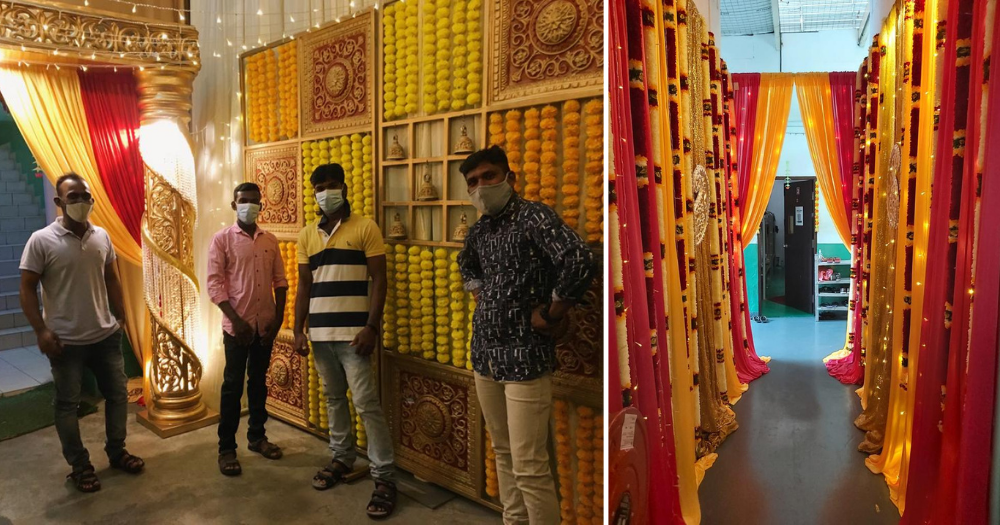It's Wednesday evening around 9pm when my Grab turns onto Tuas View Square. Stacks of wood pallets and lorries line the sides of the narrow one-way road.
As we cruise past dormitory after dormitory, I worry that I won't be able to identify the address I'm looking for.
But as my Grab pulls to a stop, I realise that my worries are unfounded. The entrance to the dormitory of McKnight Engineering stands out on the dark street, brightly lit with fairy lights, curtains, and spotlights for Deepavali.
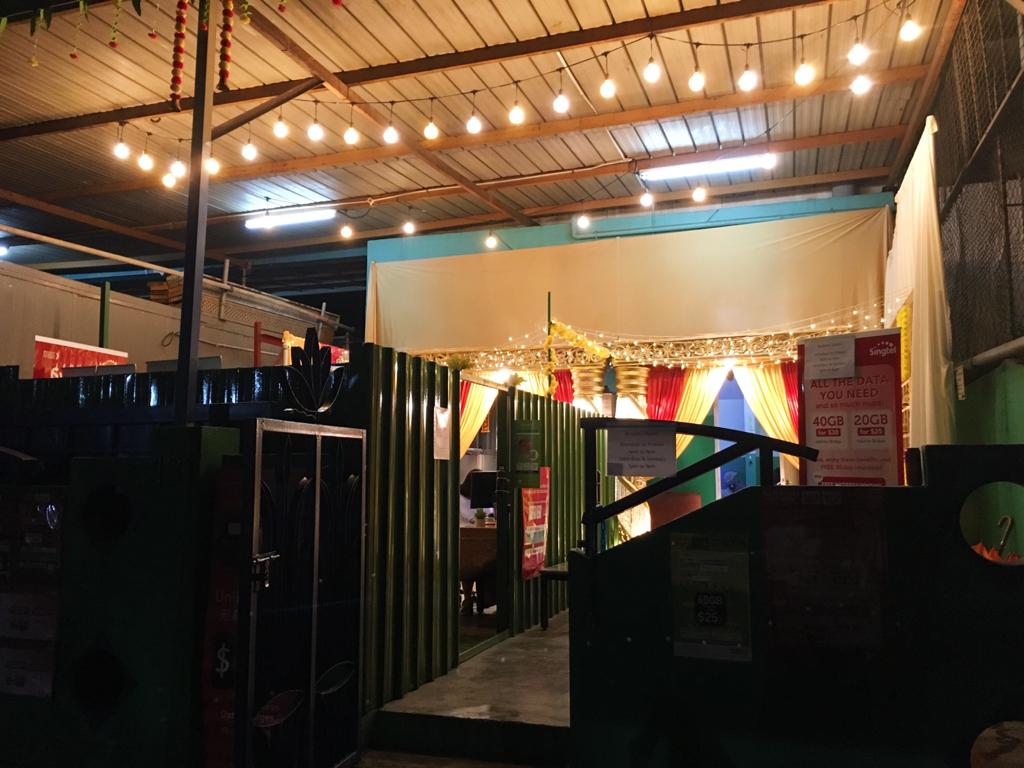 Photo by Jane Zhang.
Photo by Jane Zhang.
On Nov. 9, Stomp published a story about a dormitory decked out in Deepavali decorations. I'm here tonight to see it for myself, and to hear from the workers.
Deepavali this year very different from past years
Deepavali this year, like many other celebrations, feels very different because of Covid-19.
And for the many migrant workers who still aren't allowed to leave their dormitories on their off days, this year's festivities stand in stark contrast from other years'.
Normally, Deepavali would be spent with friends near Tekka Centre and Little India, several of the workers tell me.
"But this year, because Covid-19, cannot going," 30-year-old Murugesan says.
Back home in Tamil Nadu, workers would typically spend Deepavali going to the movies, going for prayers at temples, and visiting family and friends.
"And mostly [fire]crackers — boom boom," explains 26-year-old Guruprasath.
But for many of the workers here, it has been years since they got to celebrate Deepavali that way.
So, to make her workers feel more at home, McKnight Engineering's managing director Joey Tan books a restaurant or club room to throw a Deepavali party for them every year — for the past 10 years.
Guruprasath shares:
"Boss family always support us. We always see in every Deepavali party. Everyone come to the party. They always celebrate with us."
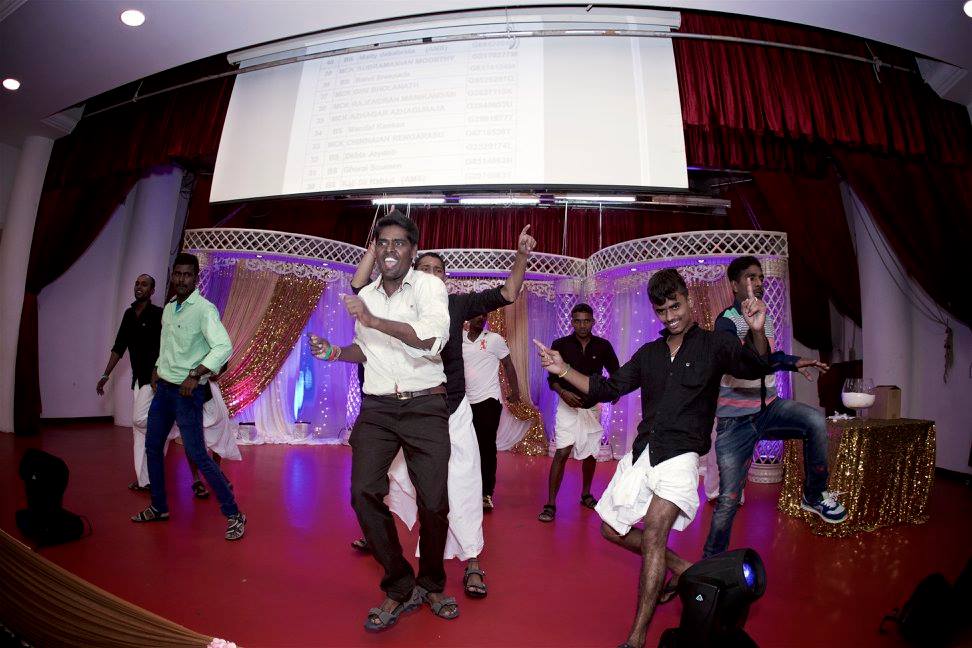 One of McKnight Engineering's past celebrations. Photo via Facebook / McKnight Engineering Pte Ltd.
One of McKnight Engineering's past celebrations. Photo via Facebook / McKnight Engineering Pte Ltd.
Unfortunately, the annual company celebration isn't possible this year, due to Covid-19 restrictions.
Arranged for special Deepavali surprise
So instead, Joey arranged for a special surprise for the 68 workers in her company, 66 of whom are from India.
It definitely gave the workers something to look forward to; 24-year-old Sakthiavel admits that he could not sleep from all the anticipation, after being told to expect a surprise the next day.
And indeed, the workers returned from work one evening to find decorations put up by an event organiser who Joey hired.
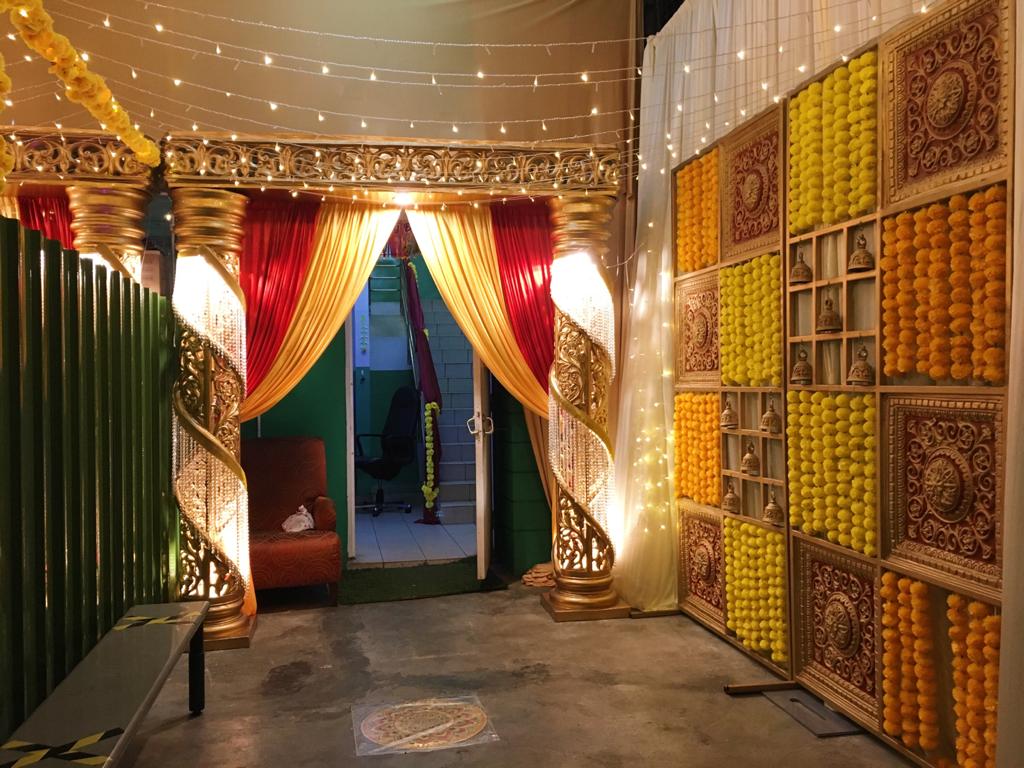 Photo by Jane Zhang.
Photo by Jane Zhang.
With lights strung across like a canopy, beautiful red and yellow curtains opening up to the entrance to the dormitory, and a colourful photo wall, the space was transformed into a festive, warm home.
Meanwhile, 37-year-old Muniasami, the dormitory's housekeeper, decorated the internal corridor, proudly showing me pictures of his setup.
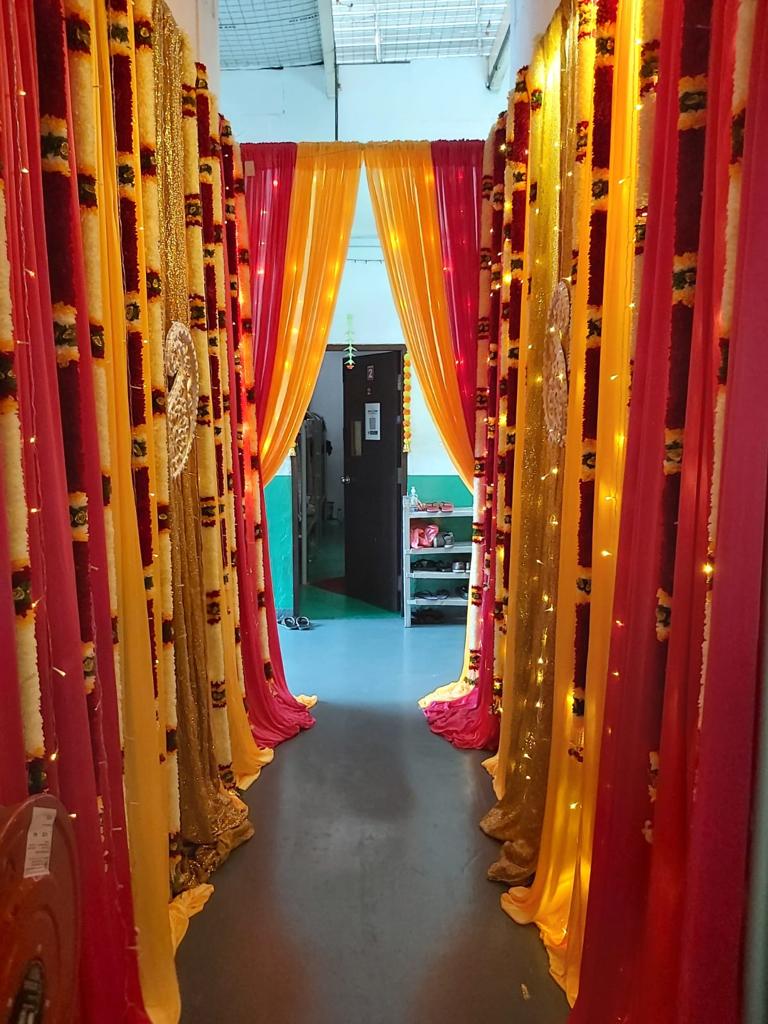 Photo courtesy of Muniasami.
Photo courtesy of Muniasami.
Seeing the decorations made them "happy, so happy," the workers echo enthusiastically to me.
"It was very, very surprise for all," 30-year-old Venkidhesan shares.
The workers all took photos of the decorations and proudly showed their families over video calls.
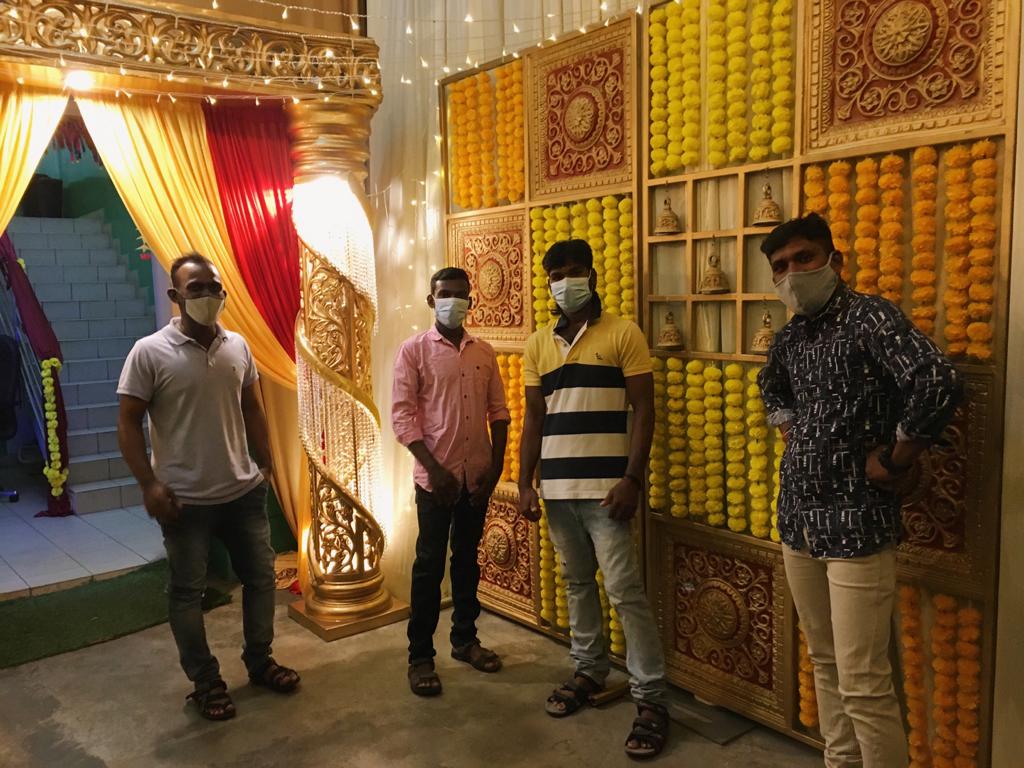 Four workers who spoke with me about Deepavali. (From left to right) Guruprasath, Murugesan, Sakthiavel, and Venkidhesan. Photo by Jane Zhang.
Four workers who spoke with me about Deepavali. (From left to right) Guruprasath, Murugesan, Sakthiavel, and Venkidhesan. Photo by Jane Zhang.
And the surprise doesn't end with the decorations; this Deepavali weekend, although there will be strictly no celebration events, Joey will be giving her workers ang paos (red packets), and has ordered three days of special luxury dishes for them.
My stomach growls just hearing Joey rattle off the menu items: Friday will be mutton and king prawns, Saturday's special will consist of masala crabs and fried fish, and Sunday will be a feast of mutton curry and fish cutlets.
Why go to such lengths, I ask.
The camera-shy boss replies:
"I just want to make them happy. They've been locked down for so many months, since April.
But it's just work and dorm, work and dorm. We couldn't throw any parties like we used to. So I thought this might brighten up their celebratory festival."
The workers are the real "bosses" of the organisation, she says: "They're the ones that are working. They deserve this, lor."
Boss gave S$4,000 to worker for his mother's cancer treatment
While many migrant workers faced salary cuts or had issues receiving their salaries during the Circuit Breaker from April to June, all of McKnight Engineering's workers were paid fully — and have even been guaranteed a bonus this year.
And the workers themselves have in turn passed this support to others; Muniasami explains that many of the workers share their earnings with their friends from other companies who have faced salary issues.
He also adds that during the Circuit Breaker, in addition to the daily catered meals, the company would order something special from a restaurant for the workers each week, like mutton dishes.
In October, Joey's sister Janet began volunteering her time at the dormitory as well.
Between 4pm and 9pm every night, she is stationed at a desk at the dormitory, where she helps workers with phone cards, online banking, and applying for debit cards, since they aren't able to go out to do these things.
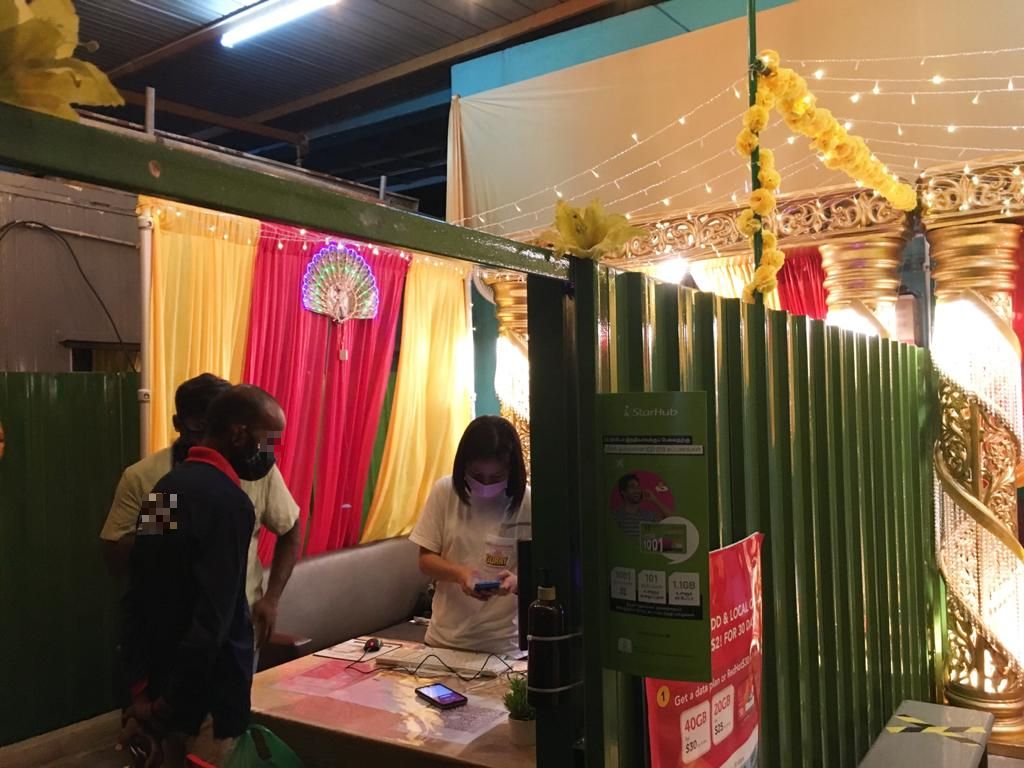 A worker from another dormitory getting Janet's help with buying a SIM card. Photo by Jane Zhang.
A worker from another dormitory getting Janet's help with buying a SIM card. Photo by Jane Zhang.
And when a number of her workers were struggling with family difficulties back home amidst the pandemic, such as parents falling ill or even dying, Joey would console them and offer her support.
She recognises how difficult it is for them to be separated from their families in their time of need:
"Despite wanting to go back, they choose to stay here for their families' needs."
When word got out that Muniasami was sending money back to his mother for her cancer treatment, Joey gave him S$4,000 without him even asking, originally as a loan.
She later told him that he didn't need to repay her.
Set up McKnight Engineering as a way to help migrant workers
This kind of personalised care and support for McKnight Engineering's workers hasn't been limited to this particularly difficult year.
In fact, the main reason Joey started the company back in 2009 was because she wanted to help foreign workers.
"I asked myself what I really wanted to do in my life, and the answer was to help people, to help more people."
She hoped to "break the rules" of the industry, in terms of how migrant workers are treated.
For example, many migrant workers have to take up huge loans, or even sell their property back home, in order to pay hefty agent fees.
So McKnight Engineering, which offers a range of services including scaffolding, insulation, and painting, hires its workers directly, bypassing the agents and the fees they would charge.
Case in point:
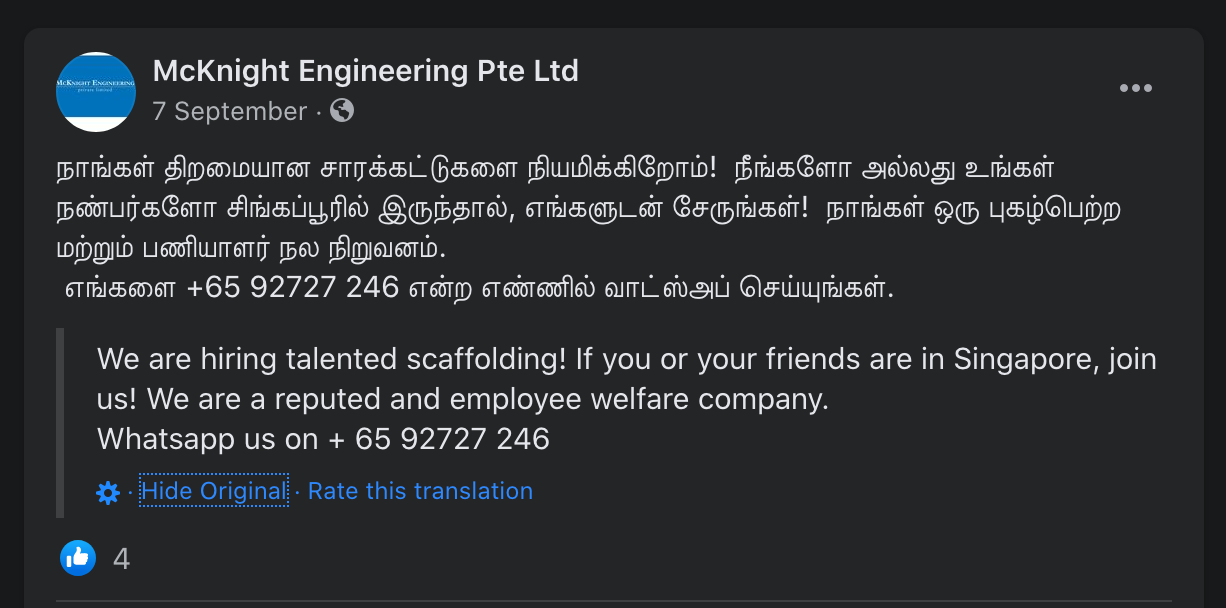
Joey also feels that her workers deserve to have certain "perks"; for instance, she provides financial support from the company for workers to send their children to school, all the way up to university.
Janet explains the reason behind her sister's thinking:
"Me and Joey were once very, very poor. We didn't have money to go to school.
That's why we told ourselves, if one day we are successful, we want to treat them like one of us."
But doesn't this mean less profit for Joey?
"Surely, surely, surely," she says nonchalantly. "It eats into my profit, [but] I don't mind. I'm enjoying it, lah."
Both of the sisters also credit others — such as the government, non-governmental organisations, and churches — for their support.
Look out for each other like a family
The ethos of Joey's company has clearly made a difference.
The workers I speak to are enthusiastic and open with their praise, and most of the company's employees have been with McKnight Engineering for more than five years.
Murugesan says: "We are all very, very lucky, working for the McKnight company, under my boss Joey Tan. It's a family. Very, very happy."
Janet brings up the idea of family multiple times during our chat. She says, laughing:
"We are one family, lah. Every day we talk, every day we play together. We disturb each other."
The company really takes care of them as if they're family, Muniasami emphasises multiple times in Tamil.
"Are your friends from other companies ever jealous?" I ask him.
Muniasami laughs behind his mask, nodding.
Janet jumps in: "Admire, lah. Not jealous. Admire."
As Deepavali rolls around, the men still miss their families greatly, as they toil more than 3,000 kilometres away from home.
Guruprasath explains:
"We have the feelings, but we cannot show. Because we come here for make money. So we have to be like that."
So Joey does what she can to make the festive time a little easier for them:
"Singapore wouldn't be where we are if not for them. They're the real heroes."
Stories of Us is a series about ordinary people in Singapore and the unique ways they’re living their lives. Be it breaking away from conventions, pursuing an atypical passion, or the struggles they are facing, these stories remind us both of our individual uniqueness and our collective humanity.
Totally unrelated but follow and listen to our podcast here
Top photos by Jane Zhang and courtesy of Muniasami.
If you like what you read, follow us on Facebook, Instagram, Twitter and Telegram to get the latest updates.
